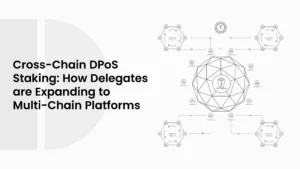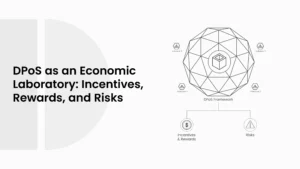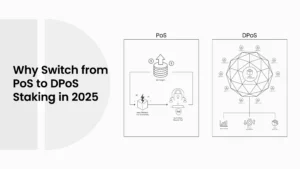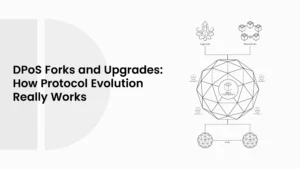How to Choose the Right Delegate or Validator in a DPoS System
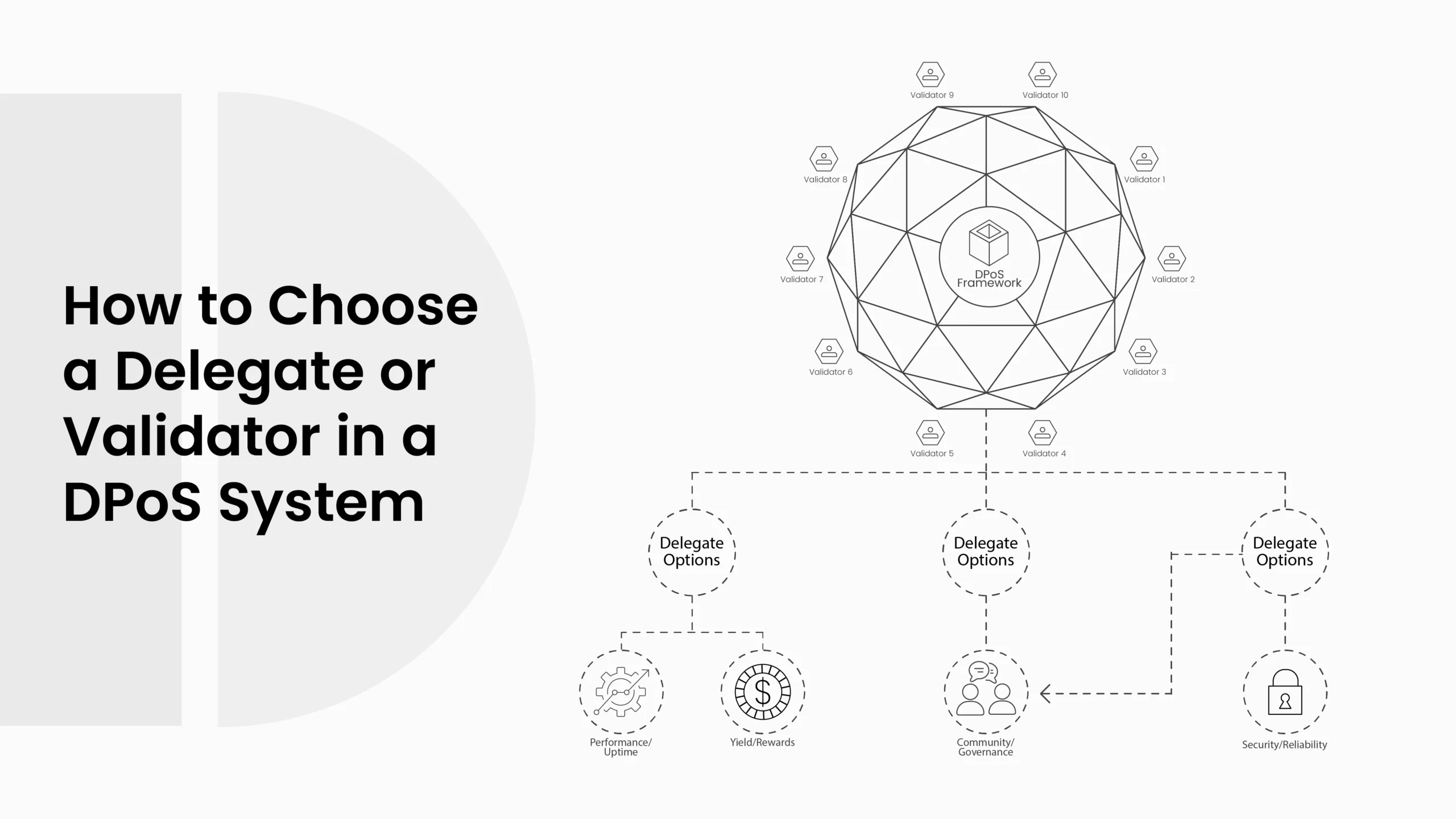
Delegated Proof of Stake (DPoS) is one of the most well-known consensus systems today, designed to provide blockchains with faster speed, greater scalability, and more democratic governance. Unlike Proof of Work (PoW) or the regular Proof of Stake (PoS), in DPoS, control is shifted to a smaller number of elected delegates or validators who assume the responsibility of running the network. But with this power also comes some risks. For token holders, picking the right delegate is not only about tech; it’s a strategy choice that can impact decentralization, security, and also the rewards you earn.
- What Are Delegates and Validators in DPoS?
- Key Criteria to Evaluate Delegates or Validators
- Uptime and Reliability
- Technical Infrastructure
- Reward Distribution and Commission Rates
- Governance Participation and Community Engagement
- Transparency and Reputation
- Practical Tips for Delegators Before Voting
- Check Validator Communication
- Compare Rewards and Fees Together
- Spread Your Stake
- Comparing Validators Across Popular DPoS Blockchains
- EOS Validators
- TRON Validators
- Solana Validators
- Red Flags to Watch Out
- How Often Should You Review Your Choice?
- Conclusion: Your Vote, Your Power
- Frequently Asked Questions About How to Choose a Delegator or Validator in DPoS
- What is the role of delegates or validators in DPoS?
- How do I know if a validator is reliable?
- Do validators charge fees?
- Can I change my delegate if I’m not satisfied?
- Why does decentralization matter when picking validators?
- Are high reward promises a good sign?
- Glossary of Key Terms
This guide will explain what makes a good delegate or validator in DPoS, why everyone’s vote is so important, and how people can make more informed choices when selecting candidates.
ALSO READ: Staking in DPoS Networks: Know All About Risks, Rewards, and ROI
What Are Delegates and Validators in DPoS?
In a DPoS blockchain, there are no miners. Rather, a fixed number of delegates, sometimes known as validators or block producers, are voted on by token holders. These are they who make new blocks, they who validate transactions, and they who keep the network safe. The blockchain varies according to the number of validators. An example is that EOS only picks 21, whereas TRON and Solana utilize larger or even varying sets.
The voting power of each person depends on how many tokens they stake. So, the bigger the stake, the more votes you get. Still, many systems try to keep things open for small holders too, by using proxy voting and other methods.
DPoS rewards honesty, transparency, and service to the community, compared to PoW, which mostly rewards raw computer power. Validators must keep the trust of the network all the time if they want to stay elected. On the other side, token holders have to vote carefully if they want to protect the chain’s integrity.
Key Criteria to Evaluate Delegates or Validators
Uptime and Reliability
Maybe the biggest factor when choosing a validator is their uptime. In a Delegated Proof of Stake (DPoS) network, validators must stay online all the time, 24/7, to keep the blockchain running smoothly and safely. If a validator is going offline too often, it leads to missed blocks, lower rewards for delegators, and even weak spots in security. Reliability isn’t just nice to have; it’s something the whole trust of the network depends on.
Technical Infrastructure
The strength of a validator’s setup makes a big difference in how well it performs. A solid validator usually runs secure and backup systems, sometimes with multiple servers, real-time data copies, and defenses against DDoS or other hacks. These things show they care about doing the job right and keeping the network strong. If these protections are missing, validators can get hit with slashing penalties or block failures, both of which hurt the delegators too.
Reward Distribution and Commission Rates
Validators in DPoS earn rewards from blocks and fees, and they share that with the token holders who delegate to them. Before voting, you should always check how the validator pays out rewards and what commission they take. Some look like they give very high returns, but maybe they have hidden rules or don’t pay on time. That can make your long-term earnings worse even if it looks good at first.
Governance Participation and Community Engagement
DPoS is not only about speed, it’s also about shared governance. Validators have a strong role in voting on upgrades, funding, and other protocol changes. That means your vote gives you a say in how the blockchain evolves. Validators who actually join governance, explain their vote, and talk with the community are more accountable. Those are the ones who tend to align with what the community needs.
Transparency and Reputation
Transparency does not exist in a trust-based system such as DPoS; it is a core component. The core network is the area of responsibility of validators, as their activity influences the whole ecosystem. The major validators share primary data like team names, infrastructure arrangements, and financial data. Others go further to keep blogs or give frequent performance updates.
ALSO READ: DPoS in Action: How EOS, TRON, and BitShares Implement It Differently
Practical Tips for Delegators Before Voting
Beyond the technical metrics, delegators need a strategy. Picking a validator is half technical, half political. Your vote helps balance the network, so some homework goes a long way.
Check Validator Communication
Good validators talk with the community. They post updates, share proposals, and explain why they vote the way they do. If a validator is silent most of the time, that’s a red flag.
Compare Rewards and Fees Together
Don’t only look at the commission percentage. Some validators with lower fees might have poor uptime, so your overall rewards may still drop. Always match fees with actual performance history.
Spread Your Stake
Putting all your tokens with one validator is risky. If they get slashed or stop performing, your returns are gone. Many token holders split their stake across 2–3 validators for safety.
ALSO READ: Rent-Seeking Behavior in DPoS: When Validators Extract Without Contributing
| Factor | Why It Matters | Mistake to Avoid |
| Uptime | Impacts both rewards and network trust | Ignoring downtime history |
| Commission Rate | Affects your earning share | Picking the lowest fee without checking reliability |
| Governance Record | Shows accountability in decision-making | Voting for passive or silent validators |
| Community Presence | Builds transparency and trust | Delegating to validators who never engage |
Comparing Validators Across Popular DPoS Blockchains
Not all validators are the same, and their role can feel very different depending on the blockchain on which they are active. Each network sets its own rules, commission models, and governance expectations. Understanding these differences helps you make more informed choices before staking your tokens.
EOS Validators
EOS is known for its 21 block producers. These validators have high visibility and are often part of larger organizations. Transparency and public communication are crucial in EOS due to its small validator set.
TRON Validators
TRON calls its validators Super Representatives (SRs). Anyone can run, but only the top 27 by votes create blocks. TRON tends to see more competition and campaign-like activity, where SRs offer incentives for community support.
Solana Validators
Solana is a high-performance blockchain with hundreds of active validators. Here, technical infrastructure and uptime are critical because downtime or missed slots can quickly impact performance. Solana validators usually run enterprise-grade setups.
| Blockchain | Validator Count | Key Feature | Risk for Delegators | Reward Style |
| EOS | 21 | Small group, high visibility | Centralization risk | Shared block rewards |
| TRON | 27 active SRs | Competitive campaigns | Vote-buying concerns | SR incentives + rewards |
| Solana | 100+ | Speed-focused, tech-heavy | High hardware costs may limit diversity | Staking returns vary by validator |
Red Flags to Watch Out
Even though most validators work with honesty, there are still some signs that should make you careful. A big warning sign is when a validator promises extremely high returns that appear too good to be true. Most of the time, these kinds of offers conceal problems such as low uptime, excessive centralised control, or even a model that can’t survive in the long term. Always compare these promises with real numbers and past performance, not just words.
ALSO READ: Which Cryptocurrencies Use DPoS in 2025? A Beginner’s Guide to DPoS Blockchains
Some validators also experienced unusual slashing events, or they did not participate in governance at all. That can mean they lack the focus and discipline needed to run stable operations. Another bad sign is when they fail to communicate, especially if something breaks down or an important vote is pending. In DPoS, trust comes from openness. Additionally, if a small number of validators control excessive voting power, the network loses its core purpose of decentralization. Splitting your stake and remaining vigilant is the best way to mitigate these risks.
How Often Should You Review Your Choice?
Choosing a validator is not something you do once and forget. Things in blockchain move fast, and validators can change their fees, miss blocks, or even stop caring about governance. To protect your rewards and security, you should review your pick often. A quick check every month helps you watch uptime and voting history, and maybe every three months, you can rethink and rebalance where your tokens are staked.
It’s also smart to be present in the community. Follow discussions, read proposals, and see what validators are saying. Being active in DPoS is not only about rewards, it’s about making the network grow better. The more token holders are involved, the fairer, accountable, and decentralised the system will stay.
Conclusion: Your Vote, Your Power
In a DPoS system, your stake is your voice. Choosing the right delegate or validator empowers you to shape the blockchain’s future while earning rewards along the way. It’s a balance between trust, transparency, performance, and shared vision.
Don’t just follow the crowd. Take the time to understand your options, review what you have chosen, and get involved in governance. Once the right validators are elected, it benefits all: the network becomes stronger, the community is stronger, and your stake becomes more secure. DPoS is not only about consensus, but also about collusion. Make informed decisions and play an active role in the success of the chain.
Frequently Asked Questions About How to Choose a Delegator or Validator in DPoS
What is the role of delegates or validators in DPoS?
Delegates, sometimes called validators or block producers, are picked by token holders. Their job is to make new blocks, check transactions, and keep the blockchain running smoothly without issues.
How do I know if a validator is reliable?
The easiest way is to look at their uptime record, see what kind of technical setup they use (like backups or extra servers), and also check what the community says about them. A validator that shows steady performance over time is usually more trustworthy.
Do validators charge fees?
Yes, almost all validators take a cut (called commission) from the block rewards before sharing the rest with delegators. You should always compare the fee % together with how regular their payouts are.
Can I change my delegate if I’m not satisfied?
Yes, in most DPoS chains, you can switch your vote and re-delegate whenever you want. It’s a good idea to check once in a while, maybe monthly or every few months, if your validator is still doing well.
Why does decentralization matter when picking validators?
When only a small group of validators gets too much voting power, the system stops being democratic and can be controlled more easily. If more people spread their votes, it keeps the network healthier and fairer.
Are high reward promises a good sign?
Not really. Many times, if a validator is offering rewards that look too high, it means they may have weak infrastructure or don’t take part in governance. Better to check actual numbers and history instead of just believing in the big promises.
Glossary of Key Terms
- DPoS (Delegated Proof of Stake): A blockchain consensus system where token holders vote for delegates/validators to maintain the network.
- Delegate / Validator / Block Producer: Elected participants responsible for validating transactions, creating blocks, and securing the chain.
- Uptime: The percentage of time a validator’s system is online and working without failures.
- Slashing: A penalty applied to validators who act maliciously or negligently, leading to loss of rewards or staked tokens.
- Commission Rate: The percentage a validator charges before distributing rewards to delegators.
- Governance Participation: The degree to which a validator engages in voting on network upgrades, proposals, and protocol changes.
- Decentralization: The distribution of control across many validators, preventing any single entity from dominating the network.
- Delegator: A token holder who votes or stakes their tokens with a validator in exchange for rewards.

